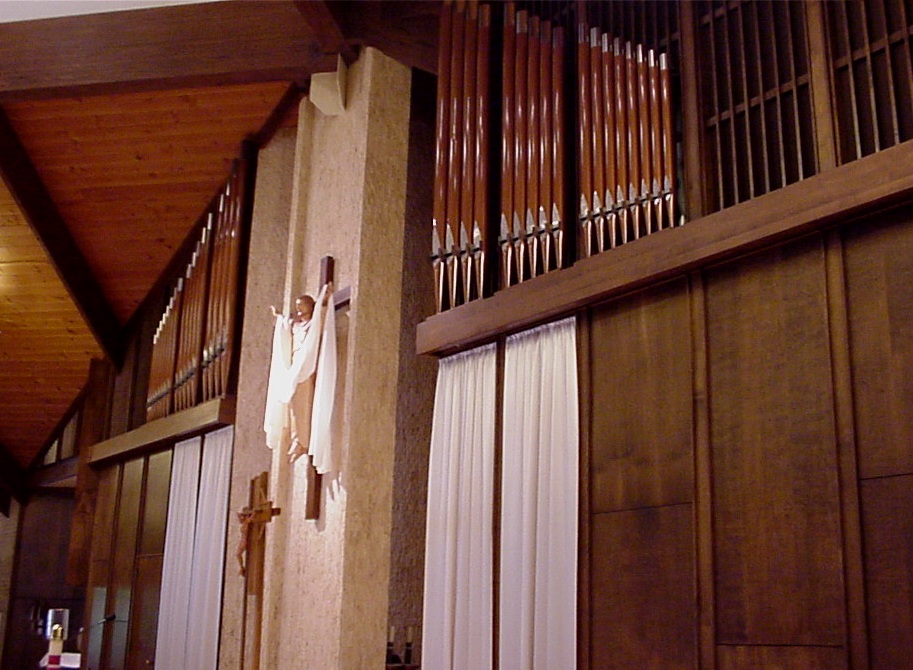St. Irenaeus Roman Catholic Church
Rochester Hills, MI Opus 32, 2010

In 1965 Casavant Frères of St. Hyacinthe, Quebec, built the
organ for Our Lady Gate of Heaven Church in Detroit. It was
installed in the rear balcony of the church. After only one or two
years, the church was renovated and the organ was moved to the
front. When that church was closed the organ became available, and
we recommended it for installation at St. Irenaeus. It replaces a
much smaller organ that had been in St. Irenaeus' original church
building. That organ had not been very successful in the new
building. This was due partly to its small size, and to the
extreme depth of the organ chambers. So we knew that the chambers
would need to be improved for the Casavant installation. Plans for
the new chamber partitions were worked out in conjunction with
Stephen Auger + Associates Architects. The walls were designed
for maximum density and sound reflection.
This organ comes from a time in which the neo-classic ideal was
being reborn. Organs from the period are characterized by low wind
pressures, smaller scales, and rich harmonic development. There
also tends to be more speech transient noise, which needs to be
adjusted for the acoustics of the room. In making plans for moving
the organ, we recommended a few modest additions to the organ.
Among these were the Nasard and Tierce mutation stops, which add
color to solo combinations. Two reed stops were added, the Great
Trumpet and the Swell Hautbois, which will enhance the versatility
of the organ. The chimes had been prepared for, but we were able
to install them due to a generous gift from an anonymous donor.
The major effort of the rebuild, besides making the organ fit
and work in the new space, was the addition of a multiplex
control system. This system includes a multi-level combination
action, and has provision for possible Midi functions and playback
features. We replaced the 56-note keyboards with 61-note models,
and the console was stripped and refinished. The facade pipes,
which compose the bass pipes of the Great and Pedal Principal
stops, were repaired and painted a copper color by Art Malburg
of Allenton Collision in Capac.
Pipe organ projects are very labor-intensive; we spent more than
2300 hours on this project, not including dismantling the organ
in Detroit. Several people were involved over the course of the
work: Edwin Judd, Michael O'Neill, Matthew Simpson, David Wigton.
Richard Swanson was involved in the voicing and tonal finishing.
Fred Oyster of Louisville, Ohio made and voiced the new reeds.
A.R. Schopp's Sons of Alliance, Ohio made the facade extension
pipes. The multiplex system is from Matters, Inc. of Hermosa,
South Dakota. For most projects, we choose to set up the organ
in our shop. However, because of the proximity of this project
we decided to work mostly on site. This may not have been a good
idea-- we ended up making over 90 round-trips from Dryden to
Rochester Hills!
It was gratifying to work with Cliff Wilkins and the Building
Committee. We thank the people of St. Irenaeus for entrusting
this project to us, and hope it will serve the liturgy well for
many years to come.
STOPLIST Great 16' Lieblich Gedeckt (Sw) 61 notes (From Lieblich) 8' Principal 61 pipes Casavant, 17 pipes en facade, painted 8' Bourdon 61 pipes Casavant 8' Erzahler 61 pipes Casavant, warped pipes straightened 4' Octave 61 pipes Casavant 4' Rohrflöte 61 pipes Casavant 2-2/3 Nasard 61 pipes Revoiced stock pipes 2' Flachflöte 61 pipes Casavant 1-3/5' Tierce 61 pipes Revoiced stock pipes 1-1/3' Mixture IV 244 pipes Casavant 8' Trumpet 61 pipes Revoiced stock pipes Chimes 25 notes (Prepared-for) Tremulant Added Swell 16' Lieblich Gedeckt 61 pipes Revoiced stock wooden pipes 8' Principal 61 pipes Revoiced stock pipes 8' Nachthorn Gedeckt 61 pipes Casavant 8' Salicional 61 pipes Casavant 8' Voix Céleste 54 pipes Casavant (Starts at GG) 4' Octave 12 pipes (Extension of Principal) 4' Gemshorn 61 pipes Casavant 4' Gedeckt 24 pipes Revoiced stock pipes (Extension of Lieblich) 2' Principal 61 pipes Casavant 1-1/3' Quintflöte 61 pipes Casavant 1' Scharf III 183 pipes Casavant, re-composed from ½' Cymbal 16' Basson 12 pipes New (Extension of Oboe) 8' Trumpet 61 pipes Casavant, warped pipes straightened 8' Oboe 61 pipes Revoiced stock pipes Tremulant Pedal 32' Resultant Acoustic (Wired from the SubBass and Bourdon) 16' SubBass 32 pipes Casavant 16' Bourdon (Sw) 32 notes (From Lieblich) 8' Principal 32 pipes Casavant, 17 pipes en facade, painted 8' Pommer 32 pipes Casavant 8' Gedeckt (Sw) 32 notes (From Lieblich) 4' Choral Bass 32 pipes Casavant 2' Mixture III 96 pipes Casavant 16' Trumpet 12 notes (Extension prepared-for) 16' Fagot 32 pipes Casavant, warped pipes straightened 8' Trumpet (Gt) 32 notes (From Great) Couplers Gt/Pd 8, Sw/Pd 8, Sw/Pd 4, Sw/Sw 16, Sw/Sw 4, Sw/Gt 16, Sw/Gt 4, MIDI/G,MIDI/S,MIDI/P Reversibles Gt/Pd, Sw/Pd, Sfz, on toe studs Combination Action 8 Generals, 4 Ped Divs, 4 Gt Divs, 4 Sw Divs, Set, GC, TR up, TR dn, Player Console Balanced pedals for Swell and Crescendo Plug-in cable for removing pedalboard; 20 feet of cable for moving console around. Totals 27 stops, 34 ranks, 1883 pipes

